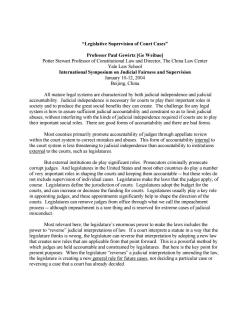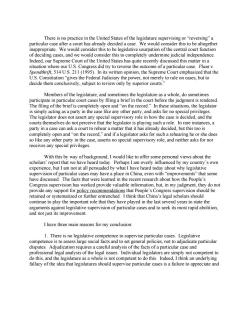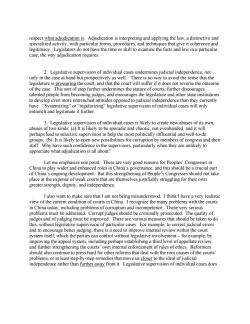《中国宪法学 Chinese Constitutional Law》课程教学资源(学术文献)LEGISLATIVE REVIEW OVER COURT DECISIONS

“Legislative Supervision of Court Cases” Professor Paul Gewirtz [Ge Weibao] Potter Stewart Professor of Constitutional Law and Director,The China Law Center Yale Law School International Symposium on Judicial Fairness and Supervision January 10-12,2004 Beijing,China All mature legal systems are characterized by both judicial independence and judicial accountability.Judicial independence is necessary for courts to play their important roles in society and to produce the great social benefits they can create.The challenge for any legal system is how to assure sufficient judicial accountability and constraint so as to limit judicial abuses,without interfering with the kinds of judicial independence required if courts are to play their important social roles.There are good forms of accountability and there are bad forms. Most counties primarily promote accountability of judges through appellate review within the court system to correct mistakes and abuses.This form of accountability internal to the court system is less threatening to judicial independence than accountability to institutions external to the courts,such as legislatures. But external institutions do play significant roles.Prosecutors criminally prosecute corrupt judges.And legislatures in the United States and most other countries do play a number of very important roles in shaping the courts and keeping them accountable--but these roles do not include supervision of individual cases.Legislatures make the laws that the judges apply,of course.Legislatures define the jurisdiction of courts.Legislatures adopt the budget for the courts,and can increase or decrease the funding for courts.Legislatures usually play a key role in appointing judges,and these appointments significantly help to shape the direction of the courts.Legislatures can remove judges from office through what we call the impeachment process--although impeachment is a rare thing and is reserved for extreme cases of judicial misconduct Most relevant here,the legislature's enormous power to make the laws includes the power to "reverse"judicial interpretations of law.If a court interprets a statute in a way that the legislature thinks is wrong,the legislature can reverse that interpretation by adopting a new law that creates new rules that are applicable from that point forward.This is a powerful method by which judges are held accountable and constrained by legislatures.But here is the key point for present purposes:When the legislature "reverses"a judicial interpretation by amending the law, the legislature is creating a new general rule for future cases,not deciding a particular case or reversing a case that a court has already decided
“Legislative Supervision of Court Cases” Professor Paul Gewirtz [Ge Weibao] Potter Stewart Professor of Constitutional Law and Director, The China Law Center Yale Law School International Symposium on Judicial Fairness and Supervision January 10-12, 2004 Beijing, China All mature legal systems are characterized by both judicial independence and judicial accountability. Judicial independence is necessary for courts to play their important roles in society and to produce the great social benefits they can create. The challenge for any legal system is how to assure sufficient judicial accountability and constraint so as to limit judicial abuses, without interfering with the kinds of judicial independence required if courts are to play their important social roles. There are good forms of accountability and there are bad forms. Most counties primarily promote accountability of judges through appellate review within the court system to correct mistakes and abuses. This form of accountability internal to the court system is less threatening to judicial independence than accountability to institutions external to the courts, such as legislatures. But external institutions do play significant roles. Prosecutors criminally prosecute corrupt judges. And legislatures in the United States and most other countries do play a number of very important roles in shaping the courts and keeping them accountable -- but these roles do not include supervision of individual cases. Legislatures make the laws that the judges apply, of course. Legislatures define the jurisdiction of courts. Legislatures adopt the budget for the courts, and can increase or decrease the funding for courts. Legislatures usually play a key role in appointing judges, and these appointments significantly help to shape the direction of the courts. Legislatures can remove judges from office through what we call the impeachment process -- although impeachment is a rare thing and is reserved for extreme cases of judicial misconduct. Most relevant here, the legislature’s enormous power to make the laws includes the power to “reverse” judicial interpretations of law. If a court interprets a statute in a way that the legislature thinks is wrong, the legislature can reverse that interpretation by adopting a new law that creates new rules that are applicable from that point forward. This is a powerful method by which judges are held accountable and constrained by legislatures. But here is the key point for present purposes: When the legislature “reverses” a judicial interpretation by amending the law, the legislature is creating a new general rule for future cases, not deciding a particular case or reversing a case that a court has already decided

There is no practice in the United States of the legislature supervising or"reversing"a particular case after a court has already decided a case.We would consider this to be altogether inappropriate.We would consider this to be legislative usurpation of the central court function of deciding cases,and we would consider this to completely undermine judicial independence. Indeed,our Supreme Court of the United States has quite recently discussed this matter in a situation where our U.S.Congress did try to reverse the outcome of a particular case.Plaut v. Spendthrifi,514 U.S.211(1995).In its written opinion,the Supreme Court emphasized that the U.S.Constitution"gives the Federal Judiciary the power,not merely to rule on cases,but to decide them conclusively,subject to review only by superior courts. Members of the legislature,and sometimes the legislature as a whole,do sometimes participate in particular court cases by filing a brief in the court before the judgment is rendered. The filing of the brief is completely open and"on the record."In these situations,the legislator is simply acting as a party in the case like any other party,and asks for no special privileges. The legislator does not assert any special supervisory role in how the case is decided,and the courts themselves do not perceive that the legislator is playing such a role.In rare instances,a party in a case can ask a court to rehear a matter that it has already decided,but this too is completely open and"on the record,"and if a legislator asks for such a rehearing he or she does so like any other party in the case,asserts no special supervisory role,and neither asks for nor receives any special privileges. With this by way of background,I would like to offer some personal views about the scholars'report that we have heard today.Perhaps I am overly influenced by my country's own experience,but I am not at all persuaded by what I have heard today about why legislative supervision of particular cases may have a place in China,even with "improvements"that some have discussed.The facts that were learned in the recent research about how the People's Congress supervision has worked provide valuable information,but,in my judgment,they do not provide any support for policy recommendations that People's Congress supervision should be retained or systematized or further entrenched.I think that China's legal scholars should continue to play the important role that they have played in the last several years to state the arguments against legislative supervision of particular cases and to seek its most rapid abolition, and not just its improvement. I have three main reasons for my conclusion: 1.There is no legislative competence to supervise particular cases.Legislative competence is to assess large social facts and to set general policies,not to adjudicate particular disputes.Adjudication requires a careful analysis of the facts of a particular case and professional legal analysis of the legal issues.Individual legislators are simply not competent to do this,and the legislature as a whole is not competent to do this.Indeed,I think an underlying fallacy of the idea that legislatures should supervise particular cases is a failure to appreciate and
There is no practice in the United States of the legislature supervising or “reversing” a particular case after a court has already decided a case. We would consider this to be altogether inappropriate. We would consider this to be legislative usurpation of the central court function of deciding cases, and we would consider this to completely undermine judicial independence. Indeed, our Supreme Court of the United States has quite recently discussed this matter in a situation where our U.S. Congress did try to reverse the outcome of a particular case. Plaut v. Spendthrift, 514 U.S. 211 (1995). In its written opinion, the Supreme Court emphasized that the U.S. Constitution “gives the Federal Judiciary the power, not merely to rule on cases, but to decide them conclusively, subject to review only by superior courts.” Members of the legislature, and sometimes the legislature as a whole, do sometimes participate in particular court cases by filing a brief in the court before the judgment is rendered. The filing of the brief is completely open and “on the record.” In these situations, the legislator is simply acting as a party in the case like any other party, and asks for no special privileges. The legislator does not assert any special supervisory role in how the case is decided, and the courts themselves do not perceive that the legislator is playing such a role. In rare instances, a party in a case can ask a court to rehear a matter that it has already decided, but this too is completely open and “on the record,” and if a legislator asks for such a rehearing he or she does so like any other party in the case, asserts no special supervisory role, and neither asks for nor receives any special privileges. With this by way of background, I would like to offer some personal views about the scholars’ report that we have heard today. Perhaps I am overly influenced by my country’s own experience, but I am not at all persuaded by what I have heard today about why legislative supervision of particular cases may have a place in China, even with “improvements” that some have discussed. The facts that were learned in the recent research about how the People’s Congress supervision has worked provide valuable information, but, in my judgment, they do not provide any support for policy recommendations that People’s Congress supervision should be retained or systematized or further entrenched. I think that China’s legal scholars should continue to play the important role that they have played in the last several years to state the arguments against legislative supervision of particular cases and to seek its most rapid abolition, and not just its improvement. I have three main reasons for my conclusion: 1. There is no legislative competence to supervise particular cases. Legislative competence is to assess large social facts and to set general policies, not to adjudicate particular disputes. Adjudication requires a careful analysis of the facts of a particular case and professional legal analysis of the legal issues. Individual legislators are simply not competent to do this, and the legislature as a whole is not competent to do this. Indeed, I think an underlying fallacy of the idea that legislatures should supervise particular cases is a failure to appreciate and

respect what adjudication is.Adjudication is interpreting and applying the law,a distinctive and specialized activity,with particular forms,procedures,and techniques that give it coherence and legitimacy.Legislators do not have the time or skill to examine the facts and law in a particular case,the way adjudication requires. 2.Legislative supervision of individual cases undermines judicial independence,not only in the case at hand but prospectively as well.There is no way to avoid the sense that the legislature is pressuring the court,and that the court will suffer if it does not reverse the outcome of the case.This sort of step further undermines the stature of courts,further discourages talented people from becoming judges,and encourages the legislature and other state institutions to develop even more entrenched attitudes opposed to judicial independence than they currently have."Systemizing"or "regularizing"legislative supervision of individual cases will only entrench and legitimate it further. 3.Legislative supervision of individual cases is likely to create new abuses of its own, abuses of two kinds:(a)It is likely to be sporadic and chaotic,not evenhanded,and it will perhaps lead to selective supervision to help the most politically influential and well-to-do groups;(b)It is likely to open new possibilities for corruption by members of congress and their staff Why have such confidence in the supervisors,particularly when they are unlikely to appreciate what adjudication is all about? Let me emphasize one point.There are very good reasons for Peoples'Congresses in China to play wider and enhanced roles in China's governance,and this should be a crucial part of China's ongoing development.But this strengthening of People's Congresses should not take place at the expense of weak courts that are themselves justifiably struggling for their own greater strength,dignity,and independence. I also want to make sure that I am not being misunderstood.I think I have a very realistic view of the current condition of courts in China.I recognize the many problems with the courts in China today,including problems of corruption and incompetence.These very serious problems must be addressed.Corrupt judges should be criminally prosecuted.The quality of judges and of judging must be improved.There are various measures that should be taken to do this,without legislative supervision of particular cases.For example,to correct judicial errors and to encourage better judging,there is a need to improve internal review within the court system itself,which the parties can control without legislative involvement-for example,by improving the appeal system,including perhaps establishing a third level of appellate review, and further strengthening the courts'own internal enforcement of rules of ethics.Reformers should also continue to press hard for other reforms that deal with the root causes of the courts problems,or at least step-by-step remedies that move us closer to the ideal of judicial independence rather than further away from it.Legislative supervision of individual cases does
respect what adjudication is. Adjudication is interpreting and applying the law, a distinctive and specialized activity, with particular forms, procedures, and techniques that give it coherence and legitimacy. Legislators do not have the time or skill to examine the facts and law in a particular case, the way adjudication requires. 2. Legislative supervision of individual cases undermines judicial independence, not only in the case at hand but prospectively as well. There is no way to avoid the sense that the legislature is pressuring the court, and that the court will suffer if it does not reverse the outcome of the case. This sort of step further undermines the stature of courts, further discourages talented people from becoming judges, and encourages the legislature and other state institutions to develop even more entrenched attitudes opposed to judicial independence than they currently have. “Systemizing” or “regularizing” legislative supervision of individual cases will only entrench and legitimate it further. 3. Legislative supervision of individual cases is likely to create new abuses of its own, abuses of two kinds: (a) It is likely to be sporadic and chaotic, not evenhanded, and it will perhaps lead to selective supervision to help the most politically influential and well-to-do groups; (b) It is likely to open new possibilities for corruption by members of congress and their staff Why have such confidence in the supervisors, particularly when they are unlikely to appreciate what adjudication is all about? Let me emphasize one point. There are very good reasons for Peoples’ Congresses in China to play wider and enhanced roles in China’s governance, and this should be a crucial part of China’s ongoing development. But this strengthening of People’s Congresses should not take place at the expense of weak courts that are themselves justifiably struggling for their own greater strength, dignity, and independence. I also want to make sure that I am not being misunderstood. I think I have a very realistic view of the current condition of courts in China. I recognize the many problems with the courts in China today, including problems of corruption and incompetence. These very serious problems must be addressed. Corrupt judges should be criminally prosecuted. The quality of judges and of judging must be improved. There are various measures that should be taken to do this, without legislative supervision of particular cases. For example, to correct judicial errors and to encourage better judging, there is a need to improve internal review within the court system itself, which the parties can control without legislative involvement – for example, by improving the appeal system, including perhaps establishing a third level of appellate review, and further strengthening the courts’ own internal enforcement of rules of ethics. Reformers should also continue to press hard for other reforms that deal with the root causes of the courts’ problems, or at least step-by-step remedies that move us closer to the ideal of judicial independence rather than further away from it. Legislative supervision of individual cases does

not do that.It is a bad idea,and I think it should be rejected
not do that. It is a bad idea, and I think it should be rejected
按次数下载不扣除下载券;
注册用户24小时内重复下载只扣除一次;
顺序:VIP每日次数-->可用次数-->下载券;
- 《中国宪法学 Chinese Constitutional Law》课程教学资源(学术文献)“Courageous Explorers”?:Education Litigation and Judicial Innovation in China.pdf
- 《中国宪法学 Chinese Constitutional Law》课程教学资源(学术文献)Drafting Legislation for Development:Lessons from a Chinese Project.pdf
- 《中国宪法学 Chinese Constitutional Law》课程教学资源(学术文献)DEALING WITH DISCRIMINATION IN MAINLAND CHINA(AN OVERVIEW OF DISCRIMINATION IN EMPLOYMENT AND THE LEGAL FRAMEWORK ADDRESSING IT).pdf
- 《中国宪法学 Chinese Constitutional Law》课程教学资源(学术文献)Developing China's Soft Power.pdf
- 《中国宪法学 Chinese Constitutional Law》课程教学资源(学术文献)Update on China’s Open Government Information Regulations:Surprising Public Demand Yielding Some Positive Results.pdf
- 《中国宪法学 Chinese Constitutional Law》课程教学资源(学术文献)Regulations of the People’s Republic of China on Open Government Information.pdf
- 《中国宪法学 Chinese Constitutional Law》课程教学资源(学术文献)Toward a More Open China?.pdf
- 《中国宪法学 Chinese Constitutional Law》课程教学资源(学术文献)China's Criminal Justice System:A Work in Progress.pdf
- 《中国宪法学 Chinese Constitutional Law》课程教学资源(学术文献)China's Changing Constitution.pdf
- 《中国宪法学 Chinese Constitutional Law》课程教学资源(学术文献)BASIC CONCEPTS OF CHINESE LAW:THE GENESIS AND EVOLUTION OF LEGAL THOUGHT IN TRADITIONAL CHINA.pdf
- 《中国宪法学 Chinese Constitutional Law》课程教学资源(学术文献)adjudication supervision and judicial independence in china.pdf
- 《中国宪法学 Chinese Constitutional Law》课程教学资源(学术文献)HARVARD LAW REVIEW(SEPARATION OF PARTIES, NOT POWERS).pdf
- 《生活中的民法》课程教学资源(教学案例)第6讲 高空抛物案例-民事判决书.doc
- 《生活中的民法》课程教学资源(教学案例)第6讲 重庆市第四中级人民法院——黔江民族医院案件.docx
- 《生活中的民法》课程教学资源(教学案例)第6讲 肯德基烫伤案——杭州肯德基有限公司、杭州肯德基有限公司绍兴华谊分店与谢文萍人身损害赔偿纠纷上诉案.doc
- 《生活中的民法》课程教学资源(教学案例)第6讲 田某诉王某某一般人格权纠纷案.doc
- 《生活中的民法》课程教学资源(教学案例)第6讲 王保富案.pdf
- 《生活中的民法》课程教学资源(教学案例)第6讲 民法基本原则案例分析(曹桂华等诉闾志华损害赔偿案)——温祯.docx
- 《生活中的民法》课程教学资源(教学案例)第6讲 张开芬诉张开芬姓名权纠纷案.doc
- 《生活中的民法》课程教学资源(教学案例)第6讲 庄保成与许仁梅、白崇朝、卧龙区鑫龙烟花爆竹有限公司健康权纠纷案.doc
- 《中国宪法学 Chinese Constitutional Law》课程教学资源(学术文献)Opening to Reform?(An Analysis of China's Revised Criminal Procedure Law).pdf
- 《中国宪法学 Chinese Constitutional Law》课程教学资源(学术文献)Constitutionalism with Chinese Characteristics?:Constitutional Development and Civil Litigation in China.pdf
- 《中国宪法学 Chinese Constitutional Law》课程教学资源(学术文献)HARVARD LAW REVIEW(Seperation of Parties, Not Powers).pdf
- 《中国宪法学 Chinese Constitutional Law》课程教学资源(学术文献)The United States of China.pdf
- 《中国宪法学 Chinese Constitutional Law》课程教学资源(学术文献)To Understand China, Look Behind Its Laws.pdf
- 《中国宪法学 Chinese Constitutional Law》课程教学资源(学术文献)The Developing Rule of Law in China.pdf
- 《中国宪法学 Chinese Constitutional Law》课程教学资源(学术文献)Judicial Reform in China and Its Political Implications.pdf
- 《中国宪法学 Chinese Constitutional Law》课程教学资源(学术文献)What Does China Mean by Rule of Law.pdf
- 《中国宪法学 Chinese Constitutional Law》课程教学资源(学术文献)Constitutional Review in China:An Unaccomplished Project or a Mirage?.pdf
- 《中国宪法学 Chinese Constitutional Law》课程教学资源(宪法条文)CONSTITUTION OF THE PEOPLE'S REPUBLIC OF CHINA(Adopted on December 4, 1982).doc
- 《中国宪法学 Chinese Constitutional Law》课程教学资源(学术文献)China's Marbury:Qi Yuling v. Chen Xiaoqi - The Once and Future Trial of Both Education & Constitutionalization.pdf
- 上海交通大学:《法理学》课程教学资源(PPT课件)司法.pptx
- 上海交通大学:《法理学》课程教学资源(PPT课件)法与人权.pptx
- 上海交通大学:《法理学》课程教学资源(PPT课件)法与政治的关系.pptx
- 上海交通大学:《法理学》课程教学资源(PPT课件)法与文化.pptx
- 上海交通大学:《法理学》课程教学资源(PPT课件)法与正义.pptx
- 上海交通大学:《法理学》课程教学资源(PPT课件)法与自由、秩序、利益与社会和谐.pptx
- 上海交通大学:《法理学》课程教学资源(PPT课件)法律方法.pptx
- 上海交通大学:《法理学》课程教学资源(PPT课件)法律的实施.pptx
- 上海交通大学:《法理学》课程教学资源(PPT课件)法律监督.pptx
